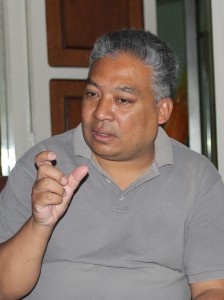 Anil Chitrakar is a successful social entrepreneur, a cultural historian, a social activist, and the list goes on. I was told that he was intelligent, knowledgeable and intellectual, what I didn’t know was, apart from all his wonderful traits, he is also a very warm, humble, and approachable person. For many years he has been working diligently for the development of the country, and has inspired many with his vision of change. As he sits next to me I feel there is so much to learn from him. His wife smiles quietly from the other side of the table, ready for us to begin.
Anil Chitrakar is a successful social entrepreneur, a cultural historian, a social activist, and the list goes on. I was told that he was intelligent, knowledgeable and intellectual, what I didn’t know was, apart from all his wonderful traits, he is also a very warm, humble, and approachable person. For many years he has been working diligently for the development of the country, and has inspired many with his vision of change. As he sits next to me I feel there is so much to learn from him. His wife smiles quietly from the other side of the table, ready for us to begin.
At the young age of 28, Anil became one of the few Nepali Ashoka fellows determined to bring positive change to the rural Nepalese community through technology. After having received his graduate education from one of the best universities in the world, The University of Pennsylvania, I couldn’t help but wonder what brought him back to Nepal, when he could have easily had a fine paying job anywhere in the world. With a soft smile, he says that he returned to Nepal because he believed that he could do so much here compared to just having a comfortable life in the States. ‘We live in a globalized world now, you can fly from Nepal in the evening to have breakfast in the States, so it’s not very difficult to travel when you need to. But when you decide to come to a developing country like ours, you need to be prepared for the challenging environment. In fact, I came back for the challenge. You need to figure out whether you want to be a small fish in a big pond or a big fish in a smaller one.’
As our conversation continues, he talks about the importance of Nepal in the Geo-political paradigm, and sustainability. Our ‘location’ is of prime importance; and we need to capitalize on this magnificent advantage. ‘Give incentives to help conserve and it will happen’ he remarks. He recalls the time when he worked with policy makers to conserve the national parks of Nepal. After making amendments to the law, fifty percent of Chitwan National park’s revenue was allocated to the local community. Thanks to wise visionaries like Anil Chitrakar, our forests increase by 2% every year. This has become a unique phenomenon in a world where deforestation is more prevalent than afforestation.
Most of us may also know Anil Chitrakar as one of the founding members of the movement Nepal Unites. On asking about his ideology behind the movement, he says, ‘we all might have excelled as individuals but we still lag behind as a team. So Nepal unites is a movement to give reasons to dissolve our differences and unite as a team striving for excellence. On being quizzed on how he mobilized masses for change, he stresses ‘it’s easy to mobilize people against something but uniting a group to create is something totally different’. He expresses that the need of the hour is changing gears from the individual to the collective. The division into individual power dilutes the sum effect. He is a bit cynical about the media when it comes to creating a rift between ethnic groups. Help people see the future; give them a vision and then they can be motivated to bring about change. Incorporating a game plan ensues. Do your own bit. Whether it is digging a local well, or establishing a community school or even organizing trifle festivities. Start small, but start something. ‘Half of the solution is taking responsibility’. It was a very interesting take on where to start. Due to issues of moral high ground we tend to demand accountability from others.
After coming back to Nepal, he out shone his contemporaries with his extensive knowledge about the places and faces of Nepal. He has been leading famous Heritage Walks that has fascinated walkers from all backgrounds with his in-depth interesting stories of history, and culture. On asking him about what he thinks about our urban planning, he says, ‘For a city like Kathmandu to have lived through eons of change and still be alive in our ancient temples and courtyards is awe-inspiring. You have the advantage of living in a city that was built 3000 years ago. You walk around Mangal Bazaar, and see dhunge dharas (stone water spouts) that have been supplying water for the past 2000 years. Compare that to western countries like America that was built only 300 years ago, and you’ll find how rich we actually are in preserving our heritage and culture’
With the interview drawing to a close I asked him about what the youth should integrate as their mantra. To this he stated that having personal values is very important. He gives examples of people like Gandhi, Ashoka, and Buddha. Those who had tremendous value systems and for that very reason, they went far beyond only riches. He suggests that we internalize these values so that mere monetary gain becomes insignificant. The need for self-empowerment cannot be overstressed. Mr. Chitrakar also emphasized a fundamental trait that everyone should have- being observant. There is no lack of inspiration to bring about a change, however minuscule it may be. Looking around you can initiate sparking that brilliant idea which would, otherwise, be lost in oblivion. And remember, it’s easy to learn skills, but values you can’t learn, you have to earn.
In our final segment, as I looked for more wisdom from him, he encouraged people to always question and be inquisitive. ‘Don’t fight gravity, work with it. If there is a problem, understand it and also keep in mind that there has to be a solution.’ if our country is mountainous don’t let this be a drawback. We cannot deny this fact but it also doesn’t mean we need to limit ourselves because of this supposed handicap. Self-pity only holds us back. ‘Think volume, not area,’ he said which summed up his keenness for frugality and efficiency.
Reinvigorated, as I took final sips of my coffee, I brought our tête à tête to a close. It was an immensely productive hour and I was buzzing with ideas and zest. Half an hour after the interview, Anil Chitrakar’s words echoed in my ears as I was walking through Durbar Square. I looked at Kathmanduists from a distance, busy with their daily chores. I feIt as if I was entering a whole new city, a city that was transformed by our old kings who had strong values, and experts that did not need a PhD or master’s degree to create strong ars for their children’s futures. I was reminded of the great minds that united to build this nation. The old bricks, the shimmering wind chimes, the floating dhwaja, the communal courtyards, the akhejyaals’¦everything looked brighter, richer, and most importantly precious. These might have been things you probably are already familiar with but when visionaries like Mr Chitrakar remind you, your realization double folds. With more people like Mr. Anil Chitrakar this country will find a way out of this melee. All we have to do is join the walk together. best casino online
